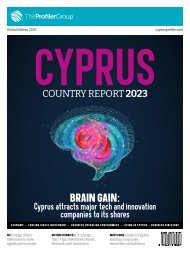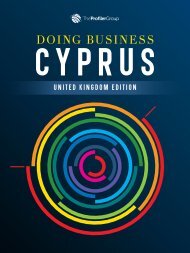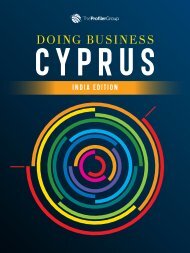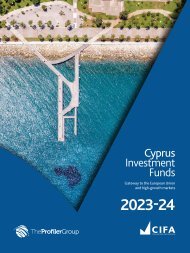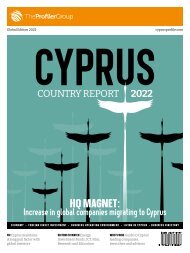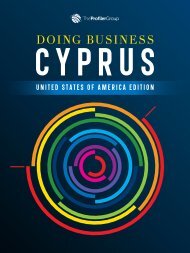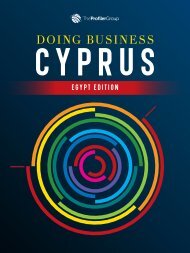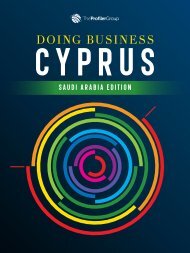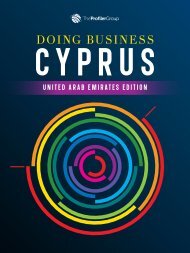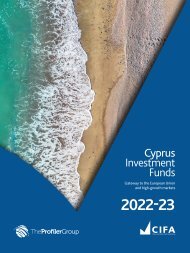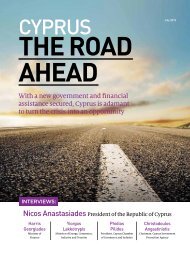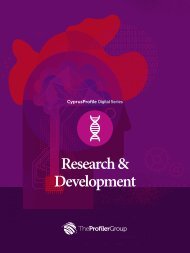2020 Cyprus Country Report
The 2020 Cyprus Country Report features in-depth articles on the economy, foreign direct investment, international trade and headquartering as well as detailed sector profiles and insights from Cyprus’ 100 most influential political, economic and business leaders shaping the future of their country and its industries.
The 2020 Cyprus Country Report features in-depth articles on the economy, foreign direct investment, international trade and headquartering as well as detailed sector profiles and insights from Cyprus’ 100 most influential political, economic and business leaders shaping the future of their country and its industries.
Create successful ePaper yourself
Turn your PDF publications into a flip-book with our unique Google optimized e-Paper software.
<strong>Cyprus</strong> has steadily<br />
established itself as a<br />
hub for quality higher<br />
education (HE). Over the<br />
last decade, the sector<br />
has grown by more<br />
than 80% in student<br />
numbers, exceeding<br />
47,000 students<br />
during 2017-2018<br />
<strong>Cyprus</strong>’ impressive handling of the pandemic<br />
is also highlighted in the island’s forward planning.<br />
As far as the upcoming academic year is<br />
concerned, many institutions have already prepared<br />
to offer teaching on campus and online for<br />
students who may be unable to travel until the<br />
situation becomes clearer.<br />
CUTTING-EDGE CURRICULA<br />
There is stiff competition for places at <strong>Cyprus</strong>’<br />
public universities, which enjoy growing international<br />
prestige and levy no charge on undergraduates<br />
from EU countries and very competitive<br />
fees for postgraduates. However, many Cypriots<br />
continue to choose to study abroad, a trend that<br />
has long ensured fresh ideas are successfully imported<br />
back to <strong>Cyprus</strong> with returning local talent.<br />
This international outlook has been increasingly<br />
strengthened with the growing number of both<br />
international students and faculty at universities.<br />
The public universities, which mainly instruct<br />
in Greek, have persuaded the government to allow<br />
them to offer more courses in English to attract<br />
more foreign students. Unlike the private universities,<br />
which teach mostly in English, their aim is<br />
not to generate revenue through tuition fees but to<br />
ensure they become truly international.<br />
Underlining the state’s commitment to lifelong<br />
learning is the government-funded Open<br />
University (OU), founded in 2002 and which now<br />
has over 4,000 students. It has flexible, modular<br />
learning programmes that provide career and<br />
personal development opportunities for students<br />
already in the workplace. The OU developed 37<br />
programmes of study for the <strong>2020</strong>-2021 academic<br />
year. The official teaching language is Greek,<br />
but currently offers five Master programmes in<br />
English.<br />
All of <strong>Cyprus</strong>’ universities design programmes<br />
to meet current business trends and<br />
future employment needs. Many of these focus<br />
on the island’s status as one of the world’s leading<br />
shipping centres and the discovery of significant<br />
gas reserves in Cypriot waters.<br />
UCY’s new Larnaca-based Faculty of Marine<br />
Sciences and Technology began its first classes<br />
in 2018, all in English, and according to Lloyd’s<br />
Register, is set to provide the local and global<br />
maritime industry with high-quality human<br />
capital and research capabilities. In 2016, UNIC<br />
launched the <strong>Cyprus</strong> Maritime Academy, which<br />
collaborates with renowned shipping companies<br />
and supports the local industry by providing<br />
qualified crew. UNIC also offers the island’s first<br />
BSc programme in energy, oil and gas management<br />
and was the first university in the world to<br />
accept Bitcoin for tuition payments and to offer a<br />
master’s degree course in digital currency, available<br />
in English both on campus and online.<br />
Online higher education is a significant and<br />
still relatively untapped opportunity for <strong>Cyprus</strong>,<br />
with the potential value of the global market estimated<br />
anywhere between €1 billion to €4 billion,<br />
for which <strong>Cyprus</strong> will be competing against anglophone<br />
countries such as Australia, Singapore,<br />
and Ireland.<br />
The European University of <strong>Cyprus</strong> (EUC), a<br />
private institution also in Nicosia, offers a master’s<br />
degree in civil and environmental engineering,<br />
a course which incorporates the impact on<br />
construction of climate change and earthquake<br />
risk.<br />
Frederick University, based in Nicosia and<br />
Limassol, is also attempting to maximise the<br />
potential of <strong>Cyprus</strong>’ natural geographical advantages.<br />
Its existing course in maritime studies<br />
now offers a new combined MA/LLM master’s<br />
degree in maritime law and shipping business.<br />
Meanwhile, the University of Central Lancashire<br />
<strong>Cyprus</strong> (UCLan <strong>Cyprus</strong>) offers a degree in cyber<br />
security.<br />
A key aspect of the rapid development and<br />
recognition of <strong>Cyprus</strong> universities has been the<br />
strategic partnerships they have forged with<br />
top institutions around the world. For example,<br />
UCY’s successful collaboration with London’s<br />
Imperial College – ranked one of the 10 best universities<br />
in the world – is set to be expanded this<br />
year with a new MSc programme that began in<br />
September 2019 to teach highly innovative and<br />
intelligent systems from emerging ICT to tackle<br />
challenges in monitoring, control and security in<br />
critical infrastructure systems. The collaboration<br />
of the two institutions in several research projects<br />
has already produced more than 900 joint publications<br />
over the last five years.<br />
Sector Profile<br />
<strong>Country</strong> <strong>Report</strong> CYPRUS <strong>2020</strong> 77



